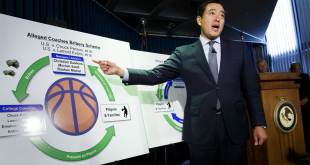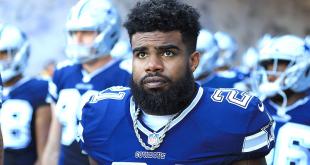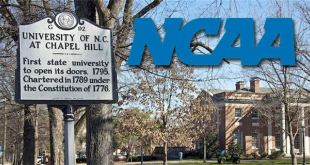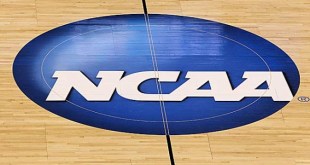The latest NCAA scandal has hit the news, but this time it doesn’t come from Indianapolis, or a school. The FBI has charged ten people involved with men’s college basketball with federal criminal charges of fraud, bribery and corruption, including four assistant coaches, managers/financial advisors, and a senior-level Adidas employee.[i] More arrests and charges will likely come as a result of the FBI investigation, but in the interim, what does this mean for these schools, involved players, and college basketball overall? I won’t focus on the details of the federal charges, but rather the NCAA aspect of what will likely be several major investigations.
The Defendants
There isn’t much to be said here. Federal fraud charges are not to be trifled with, and unless they work out some awesome deals, they could all be going to prison for a while. The NCAA does not have significant authority over individuals that aren’t employed by a conference, school, etc., so other than public censure, hands are mostly tied. Augustine, who is involved with AAU basketball, can be barred from NCAA-certified events, as a rule prohibits anyone who has been convicted of any felony from operating or coaching in certified events or leagues. This is a serious issue for any AAU coach, because the biggest recruiting opportunities arise in these specific events that NCAA rules allow college coaches to attend.
In the unlikely event that any of these four assistant coaches keep their jobs, or even without jobs, the NCAA is likely to come back with a “show-cause” penalty, which all but makes them unemployable. This penalty sticks with a coach for a set period of time, with whatever sanctions the NCAA has imposed based on the impermissible conduct. In the event a school hires such a coach, any and all NCAA-related penalties that tie into that show-cause penalty are now imposed on that school. These coaches could very well be done with their collegiate coaching careers.
The Schools
An interesting note about the FBI complaints and proceedings are that they see the NCAA schools as the victims here. These involved individuals conspired to defraud the institutions who were giving athletic scholarships to athletes for their participation in the men’s basketball programs. These acts were concealed, and as they were all completed in violation of NCAA rules, these people knew that the athletes would not be eligible, yet steered them to the schools anyway.
The NCAA on the other hand is likely to immediately put these schools in the crosshairs. Not only are these programs facing sanctions, their head coaches are facing sanctions as a result of recent rule changes to hold head coaches more accountable for their programs.[ii] Jim Boeheim and Rick Pitino (oh hey Rick, welcome back!) were unable to rebut the presumption that they had knowledge of what was occurring in their programs in previous NCAA investigations, and those did not rise to the level of giving thousands of dollars to prospective or enrolled student-athletes. Based on the facts detailed in the complaints, it may be difficult to for any head coach at the involved schools listed here.[iii]
Schools Without Defendants
Let’s first take a look at the schools without named defendants: Louisville and Miami.[iv] Other coaches involved in this scheme were named as a result of receiving money to direct athletes back to those providing the cash. These schools had coaches mentioned, but unnamed, as they currently have no federal charges being brought against them. Both schools have a history of significant violations in the past. The coaches involved (mentioned by the FBI just not by name) have impermissibly been involved in providing benefits to prospective student-athletes, which would fall under NCAA Bylaw 13.2 concerning recruiting Offers and Inducements. This is also covered under NCAA Bylaw 10.1(b) under Unethical Conduct: “Knowing involvement in offering or providing a prospective or an enrolled student-athlete an improper inducement or extra benefit or improper financial aid.”
Louisville is still under probation for significant recruiting violations. In the Gatto complaint, a Louisville assistant coach is mentioned as being present for a conversation about Adidas getting money to a prospective student-athlete. “Coach-1” (as referred to) was integral in conversations to pay a prospect in order to get him to come to school, and seems to be blatantly guilty of NCAA violations, but without accepting money, may not fall within the fraud charges. “Coach-2” was also documented as having conversations with the named Gatto about “getting additional money” for the player.
From the information presented here, Louisville men’s basketball should be eligible for the death penalty. Level I-II violations with coach involvement, while on probation for other recruiting violations, is about the worst possible outcome for the school. The NCAA death penalty is reserved for repeat offenders with a second major (Level I) violation within five years of announcement of the first major case. In summation, I’m not sure it could look any worse for Louisville men’s basketball.
“Coach-3” from Miami was involved in conversations with defendants working for Adidas to get cash to a prospect and ensure their commitment to the university. This coach was in touch with Code and Dawkins about preventing a prospect’s commitment to a rival. Again, this is a blatant violation of NCAA rules, and Miami will likely face significant sanctions from the occurrence. Luckily for Miami, reading the NCAA death penalty page in the same way as before, their previous violations were announced more than five years ago. While Miami was penalized in 2013 (including men’s basketball), if the 2011 announcement is the standard for repeat offenders, then Miami just escapes the death penalty.
Schools with Defendants
Don’t get me wrong, these schools (Arizona, South Carolina, Southern California, Auburn, Oklahoma State) are in just as hot water as Louisville and Miami, but the analysis has one additional violation to mention, and is pretty much the reason why NCAA violations rose to the level of federal crimes. The four coaches that accepted money from outside parties to turn around and funnel athletes their way triggered the litany of charges against them, but also triggered another section of the Unethical Conduct rule. NCAA Bylaw 10.1(d) includes “Receipt of benefits by an institutional staff member for facilitating or arranging a meeting between a student- athlete and an agent, financial advisor or a representative of an agent or advisor (e.g., “runner”).”
All of these schools are in the same boat; institutional staff members broke recruiting rules significantly, and these schools will face Level I/Level II violations as a result. Unlike Miami and Louisville, none have serious men’s basketball violations within the last 5-10 years, and should not necessarily be in danger of receiving anything past your standard heavy sanctions for recruiting violations of such high dollar amounts.
Prospective and Enrolled Student-Athletes
At least five current or future men’s basketball student-athletes are mentioned in this massive FBI investigation. While none of them broke the law, the FBI does a good job of giving enough information to figure out who most, if not all of them are. These would likely also trigger NCAA investigation, from the school at the very least, if not the NCAA, and will potentially result in permanent ineligibility for all of the athletes due to the significant level of impermissible benefit ($25k-100k+ is a bit more than an extra pair of shoes or tattoos for free).[v]
What’s Next?
This FBI investigation has already laid significant groundwork for the NCAA to basically come in, dot some I’s, cross some T’s, and lay the proverbial smack down on some schools. Most of the investigating is done, I’m not really sure how much more they need to prove. While there is no requirement for the FBI to help the NCAA out in any way with investigations, nor does the NCAA have any subpoena power over the FBI, the investigative work completed and detailed in the complaints alone provides ample information. USC has already hired Louis Freeh to look into the Bland allegations. Additionally, the cooperating witness was accused of wire fraud charges associated with payments and loans were made to NCAA student-athletes to earn their business later. Even on top of these complaints from the US Attorney’s Office today, this issue could continue through both FBI and NCAA investigations to find more of both federal crimes and NCAA violations. The NCAA does have a statute of limitations on allegations made past four years[vi] (what a coincidence that it’s 2017 and the witness’ charges stopped in 2013), which possibly means everything associated with the individual is chalked up to “out of sight, out of mind.” As of right now, get ready for the FBI to uncover more, and get ready for the NCAA Enforcement staff to start putting in overtime.
[i] Chuck Person – Assistant Coach at Auburn University.
Rashan Michel – Former referee, owns Thompson Bespoke Clothing.
James Gatto – Director of Global Sports Marketing – Basketball at Adidas.
Lamont Evans – Assistant Coach at Oklahoma State University, formerly at South Carolina.
Emmanuel “Book” Richardson – Assistant Coach at University of Arizona.
Tony Bland – Assistant Coach at the University of Southern California.
Merl Code – Former Nike executive who went to Adidas.
Christian Dawkins – NBA agent.
Jonathan Brad Augustine – Program Director involved with AAU and an Adidas-sponsored team, president of nonprofit The League Initiative.
Munish Sood – Financial advisor.
[ii] 11.1.1.1 Responsibility of Head Coach. An institution’s head coach is presumed to be responsible for the actions of all institutional staff members who report, directly or indirectly, to the head coach. An institution’s head coach shall promote an atmosphere of compliance within his or her program and shall monitor the activities of all institutional staff members involved with the program who report, directly or indirectly, to the coach.
[iii] To date, I do not know of any head coaches to successfully overturn an 11.1.1.1 charge under head coach responsibility. I posed the question to Justin Sievert of Sievert Werly LLC who deals with NCAA legal issues: “Not that come to mind, but sometimes the cases are a little sketchy when it comes to providing analysis of allegations made but not found, or issues investigated but ultimately not alleged. So, it would be unfair to say it hasn’t been rebutted. More fair to say if alleged, COI [Committee on Infractions] has sided with enforcement.”
[iv] The FBI names no party (individual or school) that is not a defendant; however, through fairly detailed description, there is a high likelihood all unnamed parties listed are correct.
[v] From an NCAA FAQ on future student-athletes: “the NCAA Eligibility Center may determine that the violations are such that permanent ineligibility for competition is the appropriate penalty.” The principle would similarly apply for current student-athletes, as schools may not seek reinstatement after a certain point. See PJ Hairston.
[vi] There are a few eventualities in which the four-year statute of limitations is brushed aside, but if it doesn’t deal enough with one specific program, it may not arise in this case.
 The Sports Esquires Putting Sports on Trial
The Sports Esquires Putting Sports on Trial






One comment
Pingback: Sports Law Links - The Sports Esquires